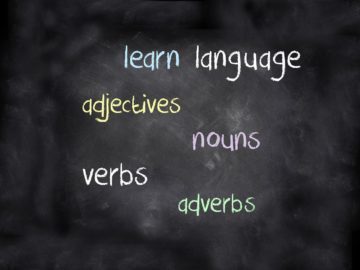All Indians are multilingual. It’s a skill you need to survive in India. First, there is your mother tongue. You pick the second language either from surroundings (parents having different languages, for instance) or in school. And the third language is English, which is also taught in school. My mother tongue is Marathi. Our neighbours were Muslims and I used to play Cricket with their children. That is how I picked up Hindi/Urdu. As a result, when I visited North India for the first time, people were surprised to know that I am from the western region because they could not detect any accent in my Hindi that is typical of the region. So I learned the first two languages without any conscious effort on my part.
My first encounter with A, B, C, D was in class V when I was 11. There are some schools where the medium of learning is English so these children start learning the language from class I. I went to a school where the medium of language was my mother tongue. Now, based on this information, you would expect that at this point, my strongest languages would be Marathi and Hindi and English would be the weakest. And you would be wrong. Here is my report card from Class X. My strongest subject was actually English!!

How and why did this happen? I can think of only one reason. My English teacher in class X was way better than the teachers of other two languages. By the way, I was also not very good in science. How I ended up in science is another loooong story that may or may not start with “It was a dark and stormy night…”. And how in the name of photon did I get an ‘A’ in ‘social service’? That’s a mystery that will remain unsolved. 😀
So when I passed Class X, I had a choice. If I went for humanities, I could choose either Marathi or English as the medium of study. But if I went for science, which I did, the medium had to be English. This is because majority of the technical terms have no substitute words in regional Indian languages. Or if they do, they are very complicated and unnatural. I chose science so my journey with English continued.
Now, you might think that this would help one in honing their language skills further. The answer is yes and no. When you study science in English, you do get better at using the language but it happens in a very limited sense. For instance, here is the Wiki entry for the definition of force :
In physics, a force is any interaction that, when unopposed, will change the motion of an object. A force can cause an object with mass to change its velocity (which includes to begin moving from a state of rest), i.e., to accelerate.If you study this kind of material for a few years, you will get better at writing reports, official documents etc. But this kind of language is very dry.
I have often thought about why the language in scientific papers has to be so impersonal. I mean, I understand that science is impartial but why can’t we have a little bit of humour? Can I start a scientific paper with, “So, a physicist walks into a bar..”?
Every language is a mirror of the culture it comes from. This is reflected in the quirks and the idiosyncrasies of the language – the phrases, the idioms, the colloquial usages. When you are learning a language, these are some of the most difficult obstacles that one faces. Let us say that a student who has newly acquired the skills of English language comes across this sentence, “He crossed the street and looked around. Nothing looked familiar, he was completely at sea.”
If the student does not know what being “at sea” means, he is going to wonder how the hero has managed to reach the seashore. Wasn’t he in the middle of Africa? So, in an ironical “Inceptional” twist, the student reading the sentence that has “at sea” in it, is, in fact, at sea himself. These kind of idioms can be very difficult to comprehend for a non-native speaker.
By the time I passed my Masters in science, I was good at official English but not at all comfortable with reading/writing non-technical documents. You rarely encounter idioms in scientific literature. However, when I finished my PhD, I found myself quite comfortable with all forms of English writing. So what happened?
I enrolled in private tuitions. I had some of the best teachers who were available 24/7 and who knew the language inside out. In fact, they are so famous that I am sure you know them. Here are a few.
Sir Arthur Conan Doyle, Isaac Asimov, Douglas Adams, Agatha Christie, Vikram Seth, Somerset Maugham, Charles Dickens.
During my PhD, when things were not going according to plans (which happened more often than I would like to admit), I procrastinated and discovered the wonderful world of English literature. While I was doing this, my brain absorbed the idioms and phrases of the English language in the background.
There is a gap here, however. I certainly don’t remember reaching for the dictionary every two minutes but then how did I get to know the idioms and phrases? Did I just guess their meaning? I am afraid I have not found an answer to that.

This method has a serious drawback. I learned most of the English grammar without realizing it. Whatever rules I had learned through rote memorization in school were long forgotten. So if you give me a sentence with incorrect grammar, I would know it’s wrong because it does not “sound right.” For the most part, I would also be able to correct it. But if you ask me to define what exactly is wrong with that sentence or which tense is it in (future imperfect or past conditional), I am completely at sea. I have no clue as to how to define the grammar of the sentence. So it is very difficult for me to correct grammar mistakes that “sound” the same – for instance, “It’s vs its“. I have tried to learn the English grammar but I forget it just as quickly. It’s as if there are certain pathways in my brain that are permanently blocked. When it comes to grammar, I have only one strategy : wing it.
If I took an English test based purely on grammar definitions, I am positive I would flunk it.
“What is a gerund?”
“Umm.. an exotic flower found only in Madagascar?” 😕



